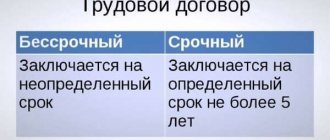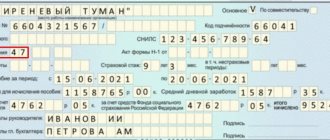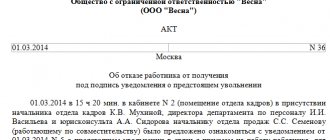What terms of an employment contract are essential?
The list of such conditions is recorded in Article 57 of the Labor Code of the Russian Federation and contains:
- Employee's work location.
- Job responsibilities.
- Exact start time.
- Principles of remuneration.
- Duration of the contract.
- Conditions and nature of work.
- Work schedule.
The document must indicate the name and exact address of the enterprise on the basis of which the employee will fulfill his work obligations.
It is presented in accordance with the principles of classification of posts and the work schedule of the enterprise, taking into account the employee’s labor obligations.
It is from the moment that is considered in the employment agreement as the first working day that the law on remuneration begins to apply to the employee.
This paragraph indicates all possible payments in the form of wages, tariff rates, bonuses, specified taking into account Article 129 of the Labor Code of the Russian Federation.
Also find out what payments are due to unemployed citizens of the Russian Federation by following the link.
In the event that the line is strictly fixed, the factors that served for its conclusion are indicated.
The regulatory act defining the relationship between the employee and the employer must contain requirements for the observance of rights and the fulfillment of necessary obligations, as well as the possible existence of harmful factors at work.
The employment agreement involves specifying the number of hours during which the employee will be at his workplace.
Vacation of employees
There is no need to calculate and pay compensation for unused vacation days to employees, since you do not terminate the employment contract with them.
The vacation experience of employees in the “new” company includes work in the previous company, and the calculation of vacation pay will take into account their wages in both companies. The vacation schedule also remains valid.
There are cases when the “old” company does not transfer information about employees to the legal successor; the amount of vacation pay will need to be calculated only based on the earnings received from the legal successor.
In what cases is a contract revision allowed and how does this happen?
All of the above conditions recorded in the TD are the most important indicator of the characteristics of work activity and can be subject to revision only in two ways:
- at the initiative of the employee;
- at the initiative of the employer.
At the initiative of the employee
The introduction of transformations in TD is regulated by Article 72 of the Labor Code of the Russian Federation and is considered permissible by agreement of both parties .
In the event that an employee decides to introduce amendments to the documented working conditions, he can submit an application to the employer , which will indicate the motives, nature and timing of the proposed changes. To avoid disputes, the appeal must be submitted in writing.
After considering the request, the employer makes a decision in writing. He has the right to either support the proposed changes or reject possible transformations of the provisions of the TD.
In the first case, the parties agree to sign an additional document fixing amendments to the employee’s labor standards. In this case, it is possible to issue a special order . If the changes were refused, then the conditions remain the same.
There are circumstances in which it is impossible to refuse to amend the TD at the request of an employee.
Thus, Article 93 of the Labor Code of the Russian Federation establishes that the head of an organization does not have the right to refuse a request for a part-time working day or week to a pregnant woman, as well as to a person who has a child under 14 years of age in his care, or who is caring for a disabled person, if this is documented confirmation in the form of a medical report.
At the initiative of the employer
In practice, provisions in TD are revised more often at the initiative of the employer. Amendments that are made without the consent of employees are confirmed by order. This legal act must indicate the reasons for the changes being introduced and their documentary evidence.
In connection with the order, the employee is sent a written notice of the implementation of changes to the previous conditions of employment. If the employee does not accept these amendments, then no amendments are made to the employment agreement.
In most cases, the employer receives proposals to change the following points of the TD:
- location of the employee’s workplace, transfer to another branch or department;
- work status, demotion or promotion of an employee with clarification of a strictly defined type of duties performed;
- changes in wages and bonus payments;
- amendments to working hours or nature of work;
- the inclusion of special conditions regarding the amount of compensation in circumstances where the employment relationship is terminated by one of the parties or by agreement.
The reasons for making amendments may be varied, but they all obey the same principle - not a single condition of the agreement between the manager and the employee should diverge from the existing norms of federal law and cause a deterioration in the employee’s situation.
All changes introduced require approval from employees. Nevertheless, Article 74 of the Labor Code of the Russian Federation provides for situations in which the introduction of amendments to the agreement between the employee and the employer at the initiative of the latter can be carried out without agreement with the employee .
Such cases include restructuring in the organization of work at an enterprise or the introduction of new technologies into work activities. This reason for introducing amendments must be documented to avoid production disputes.
FSS benefits
The assignee pays for all sick leave for employees of the previous company, issued before and after its reorganization, but only on the condition that the region is not a participant in the Social Insurance Fund pilot project. There is nothing wrong with the fact that these certificates of incapacity for work indicate the previous company , since they could have been issued before the reorganization. After all, in relation to employees, the new employer is the legal successor.
Calculation of benefits in full takes into account the wages of employees during the entire billing period in the old company. In turn, this company transmits all information on employee salaries and salary certificates from other employers presented when these employees were hired.
There are cases that information on wages was not transferred to the legal successor. Then the employees write you a statement asking you to make a request to the Pension Fund to receive salary data from the previous company. Before receiving information from the authority, calculate the amount of sick leave based on available salary data. And after you receive the data from the Pension Fund, recalculate and pay additional benefits.
If your company has employees who are on maternity leave at the time of reorganization, and their number of vacation days has been extended, then in this case you will need to pay extra for the additional days. Calculate the amount of the additional payment based on the same average earnings as in the original document.
Also, the reorganized company may have an employee on staff who is on parental leave. Such an employee does not need to write any new applications for leave and transfer of benefits. If the employee still receives monthly child care benefits for up to one and a half years, the “old” company accrues and pays it until the termination of operations, and the successor company begins to pay it in the same amount from the day the employee transfers to it.
Change order
After making a decision to amend the employment agreement due to the organizational and technological characteristics of the work, the manager notifies the employee.
If he cannot accept the new working conditions, then the employer must make a proposal to appoint him to another position that would correspond to his professional preparedness.
If the current situation does not imply the availability of appropriate work, a vacant lower position with a reduced salary must be offered. If the employee refuses this work option, then the TD is terminated in accordance with Article 77 of the Labor Code of the Russian Federation .
A transfer is a change in an employee’s work activity within one organization, which is accompanied by significant changes in TD points. They are carried out only by mutual agreement.
Consent to such a transfer is documented; without this written confirmation, the employee has no right to begin performing another type of work .
The transfer of an employee to work in another branch of this company is carried out by terminating the employment relationship at the previous place of business. It can be carried out on a permanent or temporary basis; the second option provides for a period not exceeding a year.
You may be interested in an article about concluding and terminating a permanent contract; read about it here.
In the event that after the completion of this period the employee is not returned to his previous position, the transfer becomes permanent.
Several types of permanent transfers are considered:
- Within one company with replacement of a workshop or department. In this case, the changes will not affect the employee’s labor functions and position.
- Transfer to a company branch located in another locality.
- Transfer to another company.
What should I do if an employee refuses to receive a notice?
If the employee refuses to receive the notice, a special act will need to be drawn up. The personnel department employee invites two witnesses. The document is filled out in the presence of a citizen and three people.
The act must reflect:
- position, full name of the compiler, witnesses;
- position, full name of the citizen;
- date of document preparation;
- information that the commission warned the person about the planned changes;
- an indication that he refused to receive the document;
- signatures of commission members.
The act is attached to a copy of the notice that remains with the employer.
Notice or warning to an employee
Notice of change in TD is a means used by the employer to convey to the employee information about the introduction of amendments to the current agreement.
This document is sent to the employee for review and signing. After review, the employee can decide whether he agrees with the proposed amendments.
The content of the notification contains a description of the essence of the innovations, the moment they come into force, and a proposal for the employee to obtain another position at the enterprise in the event that these circumstances do not allow him to fulfill his job duties.
Notification form
There is no official unified , and the rules for its preparation are not enshrined in regulations. Enterprise management develops this document differently for their enterprises.
But, despite this, it is necessary that the content of the notice of transformation of the essential conditions provided for by the Labor Code contains all the necessary information provided in Article 74 of the Labor Code of the Russian Federation.
The absence of even one point can lead to a violation of the Labor Code and cause serious consequences for both parties to the agreement.
Notice periods
Federal law prescribes the following deadlines for notifying employees of the amendments being introduced:
- For enterprises – a maximum of 2 months before the start of reforms;
- For individual entrepreneurs – from 2 weeks ;
- For religious organizations - at least 1 week .
notifications can be found via this link.
Document preparation
This document does not have a unified form; it can be drawn up arbitrarily, but on the organization’s letterhead. The document is drawn up in two copies. The employee will have to sign each of them. One copy remains with the employer, the second is given to the employee.
Who should sign
The notification must be signed by a responsible employee of the company. The best option is if it is the director’s autograph, but this is not always possible, especially in large enterprises where there is a large staff and many structural divisions, so an employee of the personnel department or another person involved in creating and sending out such notifications can sign for the director.
Sample notification of changes in the terms of an employment contract
Notification of changes in the terms of an employment contract does not have any specific form. Its content is important:
- Who directs to whom?
- Availability of dates: the document was drawn up and the changes began to take effect.
- The essence of the changes.
- Signature of an authorized person.
It is possible to include in the text a proposal to fill existing vacancies if there is a high probability of the employee refusing the proposed changes.
The employee is introduced to the notice against signature with the obligatory indication of the date of this acquaintance. On it, he can make a record of his consent to continue working under the changed conditions.
On our website you can see one of the options for such a notification.
Reporting
The old company, when filling out the DAM report, includes the amounts of payments to employees until the end of the reorganization. In turn, the new employer reflects the amount of payments of such employees from the first day of work with him in the calculation.
The reorganized company must provide personalized accounting information to the Federal Tax Service within 1 month from the date of approval of the transfer act in relation to dismissed employees.
As you and I can see, the accountant of the reorganized company has urgent matters to submit reports on personal income tax and insurance contributions before the organization ceases to operate. And the accountant of the successor company will not have any difficulties if the previous company transfers to it all the documents regarding the employees.










